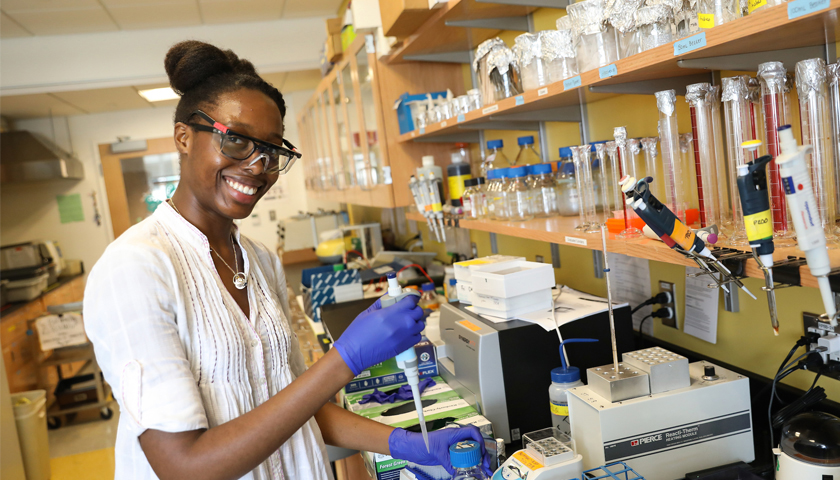Uncovering Clues to a “Medical Mystery”

Research Published
Part biochemistry major, part detective.
That was the dual role that Suffolk alumna Sabrina Phanor took as she worked on her honors thesis.
“Some people might describe my research as a ‘medical mystery,’” she said.
In the end, her journey of discovery helped to solve a perplexing issue involving a teenage Massachusetts General Hospital patient with Fumarate Hydratase Deficiency (FHD), a rare metabolic disease.
Rare affliction
FHD affects only about 100 people worldwide and results from two defective copies of the fumarase gene, one from the mother and one from the father. In most cases, the brain does not get adequate energy to develop, and many children with the disease do not survive past infancy or early childhood.
What makes the case that Phanor worked on so puzzling is that the patient survived to the age of 16 at the time of the study in 2017, with fewer developmental delays and problems typical of the disease.
“This patient inherited two different mutations from mom and dad,” said Phanor, Class of 2018. “For me, the goal was to analyze the enzyme activity of the two fumarase variants to understand the patient’s longevity.”
“This patient inherited two different mutations from mom and dad. … I was able to obtain great data to make my interpretations and give the family of the patient answers and the collaborators substantial information.”
Sorting out an atypical case
Phanor found that one of the patient’s alleles was defective for enzymatic activity. However, she also uncovered that the other allele was surprisingly active, possibly explaining why the patient’s disease was relatively mild.
“I was able to obtain great data to make my interpretations and give the family of the patient answers and the collaborators substantial information,” she said.
The project tested Phanor’s research, organizational, and communication skills to the highest level and taught her to “think like a scientist.”
Teamwork
She also learned the importance of working in a team environment alongside Chemistry and Biochemistry Professor Melanie Berkmen; alumna Olivia Grocott, Class of 2015, who was working as a research assistant at MGH at the time; and Dr. Ronald Thibert.
“Olivia knew that I had started a Biochemistry II lab course curriculum on fumarase deficiency, so she contacted me immediately about a possible collaboration,” said Berkmen. “The fact that the patient was being seen a few blocks away at MGH was a unique opportunity for all of us.”
Phanor was a Suffolk McNair Scholar and a member of the executive board of University’s chapter of the American Chemical Society and the American Society of Biochemistry and Molecular Biology.
“Sabrina really immersed herself in everything she could while at Suffolk, and that is the key to her success,” said Berkmen, a mentor to Phanor throughout her undergraduate years. “She is intelligent, passionate, and has a super-bright future.”
A career in research
Berkmen noted that faculty in the sciences at Suffolk are training students in skills that are highly desired by research labs, biotech, and chemistry companies.
Phanor is now applying the lessons she learned at Suffolk as a technical research assistant in the medicine-genetics department at Brigham and Women’s Hospital.
Media Contact
Greg Gatlin
Office of Public Affairs
617-573-8428
[email protected]



